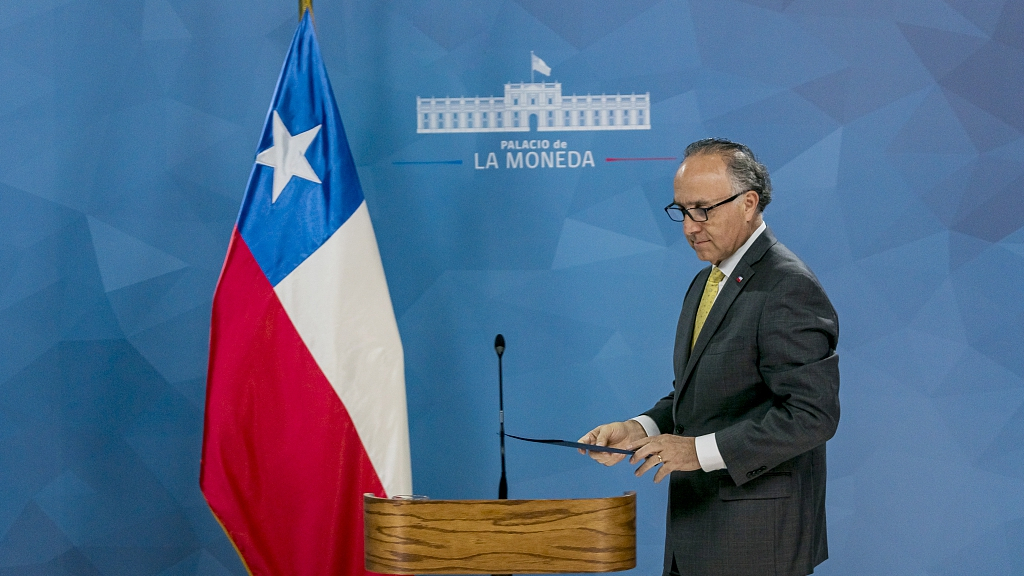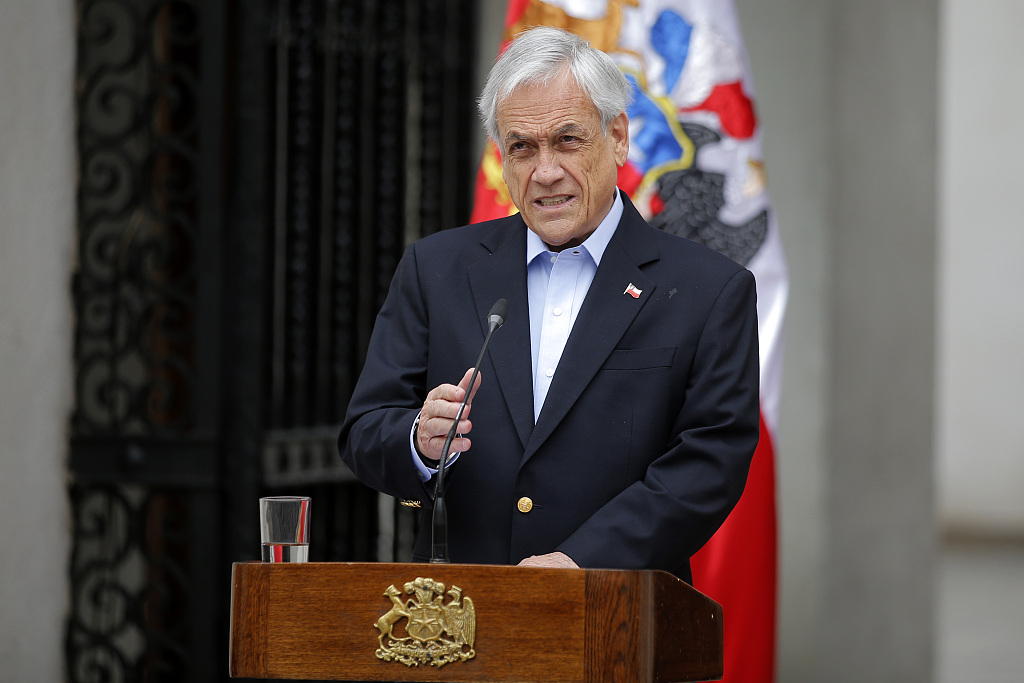
Foreign Minister Teodoro Ribera arrives at the press conference to announce Chile will not host the APEC Leaders' Meeting and the COP25 climate meeting amid massive protests at Palacio de La Moneda in Santiago, Chile, October 30, 2019. /VCG Photo
Foreign Minister Teodoro Ribera arrives at the press conference to announce Chile will not host the APEC Leaders' Meeting and the COP25 climate meeting amid massive protests at Palacio de La Moneda in Santiago, Chile, October 30, 2019. /VCG Photo
Editor's note: Lyu Yang is an assistant research fellow at the Institute of Latin America Studies under the China Institutes of Contemporary International Relations. The article reflects the authors' opinion and not necessarily the views of CGTN.
Hours after President Trump announced that he would visit Chile and attend the 27th Asia Pacific Economic Cooperation (APEC) Leaders' Meeting, his hope was lost in the most unexpected way.
In a media address on October 30, Chilean President Sebastián Piñera announced that his government would cancel the Asia-Pacific Economic Cooperation (APEC) Leaders' Meeting in mid-November and the COP25 UN climate conference the following month due to social unrest in the Latin American Organisation for Economic Co-operation and Development (OECD) country.
It all started in early October, when Santiago, the capital city of Chile, decided to raise the price of a ride on the metro system by 30 pesos (four U.S. cents). The fare hike soon caused mass protests, affecting various forms of public infrastructure.
On October 18, President Piñera called off the subway fare hike. He also unveiled a series of progressive economic reforms, reshuffled the cabinet and ended the nightly curfews.
But all his efforts didn't seem to help much, young people poured onto the streets, demanding that the government address Chile's social inequality rather than a 30-peso fare raise.
Though considered the most developed country in Latin America, Chile has been suffering from a social gap for decades. The country has a Gini index of more than 0.5, and 50 percent of its workers earn less than 400,000 pesos (538 U.S. dollars) per month while the rich 1 percent earns 33 percent of Chile's wealth.
Chile's decade-long fast economic growth is also losing its pace due to internal and external uncertainties. Growth expectation for 2019 has come down from 3-4 percent over the past several years to only 2.6 percent, causing currency devaluation and inflation, which influence the lives of the middle and lower class.
Finding no effective way to end the protests, President Piñera has had to cancel the coming APEC Leaders' Meeting and the COP25 conference.
For Chile, the yearlong APEC Leaders' Meeting preparation has been in vain. Meanwhile, world leaders will have to cancel their visits to Chile, causing millions of dollars in economic losses.

Chilean President Sebastian Pinera addresses the nation in Santiago, October 26, 2019. /VCG Photo
Chilean President Sebastian Pinera addresses the nation in Santiago, October 26, 2019. /VCG Photo
Chile's APEC cancellation puts the nation under the microscope and creates some uncertainties for the international community.
It is also an uncharted situation for APEC organizers. Last year's Papua New Guinea APEC ended with no joint statement due to China-U.S. discord. Chile was ambitious about this year and spared no efforts to achieve a final declaration, to open up a new era for APEC. However, now, instead of welcoming a new era, the APEC mechanism may face a new challenge.
Frustrating as it is, we are not facing the end of the world. Chile's longstanding opening-up policy and its reliable democratic system still work as a safeguard to the Andean country's promising future.
But, for now, Chile must initiate a full-scale structural reform and push forward more inclusive development, and to accomplish that, a calm and serious nationwide dialogue is urgently needed.
As for APEC, most of this year's ministerial meetings have already achieved substantial results, which means APEC's working-level activities and projects are still functioning. By continuing to promote multilateralism and free trade through joint efforts, all APEC members can always hope for a bright future.
This is also due to the fact that although uncertainty surrounding the global economy is rising, it is widely expected that China and the U.S. may sign a "phase one" trade deal this year that is supposed to inject stability into the world economy.
U.S. President Donald Trump also seems to be counting on this possible deal to stimulate the U.S. economy and help with his embattled 2020 general election.
China's Ministry of Commerce also issued a statement on Thursday, saying that Chinese and the U.S. trade delegations have maintained close communication and the consultation is progressing smoothly.
In sum, the cancellation of the APEC meeting to be held in Chile is not the end of the world. On the one hand, confronting the current domestic uncertainties, officials from the Chilean government should shoulder the responsibility to revive its economy and maintain social stability. However, on the other, leaders from countries around the globe can still plot development for a better world through negotiations or dialogues.
(If you want to contribute and have specific expertise, please contact us at opinions@cgtn.com.)